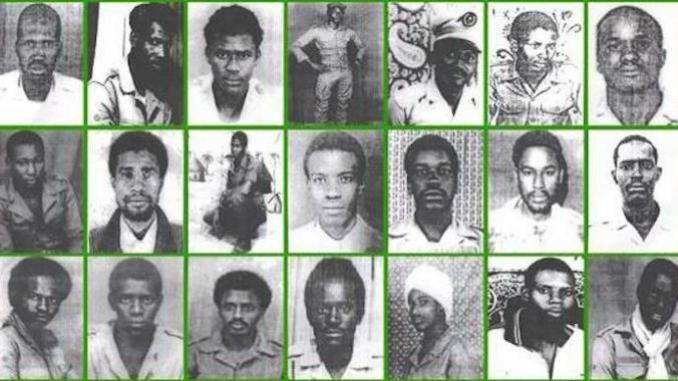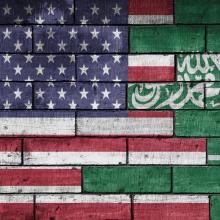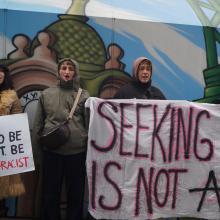August 13, 2020
Lire la page en français
On November 28, 2019, Mauritania celebrated the anniversary of its independence from France. This date corresponds with another, less joyful, anniversary, that of the summary execution of 28 Afro-Mauritanian soldiers on November 28, 1990. Taking place at the Inal military base, this event is symptomatic of the gross human rights violations committed during the so-called "Passif humanitaire" period between 1989 and 1991.
Almost three decades later, victims and their relatives continue to suffer from the provisions of Act No. 93-23 of June 14, 1993 (the “Amnesty Law”), which grants amnesty to members of the security forces for any crimes they may have committed during the "Passif humanitaire".
On November 28, 2019, MENA Rights Group and the Cadre de Concertation des Rescapés de Mauritanie (CCR-M) requested that the Special Rapporteur on the promotion of truth, justice, reparation and guarantees of non-recurrence intervene with the Mauritanian authorities to ask them to solve the "Passif humanitaire". This approach revolves around a dozen testimonies from victims and their families which illustrate the scale and gravity of the violations which took place during this period.
Background of the “Passif humanitaire”
Since the late 1980s, the Mauritanian government, then led by Colonel Maaouya Ould Sid'Ahmed Taya, has expelled more than 60,000 Mauritanians from the Halpulaar, Soninke and Wolof communities, known generically as "Afro Mauritanians." The expulsions took place during a period of border-tensions between Mauritania and Senegal and were followed by other human rights violations.
Between October 1990 and mid-January 1991, the authorities arbitrarily arrested approximately 3,000 Afro-Mauritanian soldiers accused of plotting a coup d'état. It is estimated that between 500 and 600 of them became the victims of summary execution, preceded by torture and incommunicado detention. Those who survived the torture were released between March and April 1991 under a presidential pardon.
Amnesty Law
Several victims and their families have tried to bring complaints before the national courts, but the latter have proved unsuccessful following the entry into force of the Amnesty Law. This legislation has been repeatedly denounced by the United Nations treaty bodies. In July 2019, the Human Rights Committee expressed concern that the Government had not considered amending the Amnesty Law.
Faced with the inaccessibility of domestic remedies, the complainants have had no choice but to turn to international jurisdictions. In 2000, a complaint was filed with the African Commission on Human and Peoples' Rights, which asked the Mauritanian authorities to "establish an independent investigation to clarify the fate of the disappeared persons, and identify the perpetrators of the violations" and to "ensure compensation for the widows and other relatives of the victims."
Complaints of torture have also been filed in Europe, particularly in France, against Ely Ould Dah, who was an intelligence officer at the Jreïda base between 1990 and 1991. On July 1, 2005, the Nîmes Assize Court sentenced him to 10 years imprisonment for directly committing, ordering and organizing acts of torture against Afro-Mauritanian soldiers in 1990 and 1991.
No full and complete reparation
The Mauritanian authorities claim to have rendered justice and awarded adequate reparations to the victims. However, this observation is not shared by the victims' associations, which believe that compensation measures cannot replace the right of victims and their families to an effective remedy.
On March 25, 2009, a collective prayer in memory of the victims was held in the city of Kaédi, acknowledging the violations which had taken place. Nevertheless, the truth about what happened during this period is still considered a national taboo, as recalled by the Special Rapporteur on contemporary forms of racism, racial discrimination, xenophobia and related intolerance.
There has never been a transparent investigation to establish the truth about the crimes committed, let alone prosecute the perpetrators. The bodies of victims of extrajudicial executions have never been returned to families who still do not have graves to gather around.
How to address the “Passif humanitaire”?
The joint communication from MENA Rights Group and the Cadre de Concertation des Rescapés de Mauritanie sets out a non-exhaustive list of measures designed to definitively solve the “Passif humanitaire”. These include repealing the amnesty law in order to establish the truth about the crimes committed, prosecuting those responsible, and the imposition of appropriate penalties. The authorities are also called upon to provide adequate compensation for all victims and their families, commensurate with the gravity of the violations and the damage suffered. However, the implementation of these measures will require real political will on the part of the Mauritanian authorities.
Draft law on transitional justice
On December 12, 2019, Mauritanian MP Anissa Ba introduced a draft law on transitional justice establishing a "High Commission for Truth and Reconciliation" and repealing Amnesty Law No. 93-23.
While this initiative is a step in the right direction with regard to the resolution of the “Passif humanitaire”, the bill lacks legal clarity in terms of accountability and fails to secure the independence of the High Commission.
On January 27, 2020, MENA Rights Group and the Cadre de Concertation des Réscapés de Mauritanie (CCR-M) sent a critical legal analysis of the bill to the Special Rapporteur on the promotion of truth, justice, reparation and guarantees of non-repetition and to the Working Group on Enforced or Involuntary Disappearances. This analysis contains a list of recommendations aimed at improving the initial draft law.
UN communication addressed to the authorities
On June 11, 2020, several Special Procedures mandate holders, including the Special Rapporteur on the promotion of truth, justice, reparation and guarantees of non-recurrence, sent a letter of allegation to the Mauritanian authorities regarding the lack of effective remedies for victims of human rights violations during the so-called “Passif humanitaire” period in Mauritania and the draft law on transitional justice introduced by MP Anissa Ba.
The UN experts expressed serious concerns about “the lack of investigation and prosecution of violations committed during the period of the Passif humanitaire”. They recalled that the Amnesty Law No. 93-23 still prevents victims from obtaining justice and reparation, creating a context of impunity that has had a negative impact on society. The Afro-Mauritanian minority continues to suffer structural discrimination, as the Committee on the Elimination of Racial Discrimination (CERD) recently pointed out in its Concluding Observations of May 2018.
While the rapporteurs welcomed the introduction of a draft law on transitional justice establishing a High Commission for Truth and Reconciliation, they regretted the lack of precision surrounding certain provisions of the text, particularly those relating to the composition, powers and mechanisms of the High Commission.
The Mauritanian authorities responded to the observations made by the Special Rapporteurs in a letter dated September 23, 2020 available here.
This article was initially published on November 28, 2019. It was last updated on November 11, 2020.






